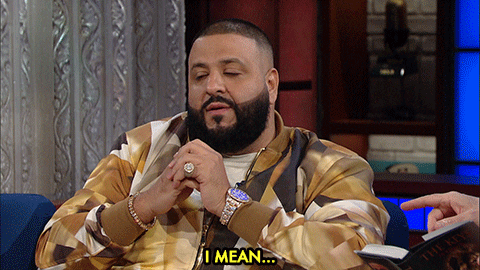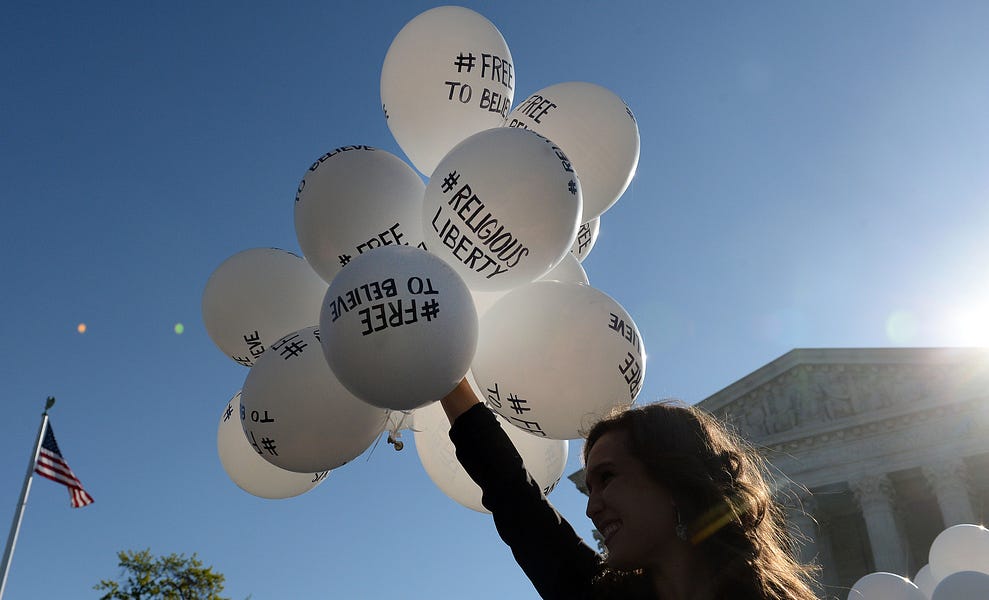Let me begin with a pop quiz. Dear readers, did Americans enjoy more religious liberty 30 years ago than they do now, in 2020? How about 50 years ago? Or 100 years ago?
Now, let’s ask a different series of questions. Did white Protestants enjoy more political power 30 years ago? Fifty years ago? One hundred years ago?
The answers to the first series of questions are 1) “No”; 2) “Heck no”; and 3) “Hold on, I’ve got an anti-Catholic state constitutional amendment to pass.” The answers to the second set are similarly dramatic. 1) “Yes”; 2) “Absolutely”; and 3) “Let’s raise a glass of grape juice to toast temperance.”
The longer the American culture war persists, the more convinced I am that the distinction between religious power and religious liberty is the key to understanding the incredible angst felt by so many white American Christians.
White Christians feel this angst even in spite of a string of court victories that have secured religious liberty from state interference to a degree that’s unprecedented in American constitutional history. And the difference between power and liberty explains why many other American religious communities do not feel similar anxiety and thus make dramatically different political choices from their white Evangelical friends.
Simply put, religious liberty is increasing even as white Christian religious power is decreasing. Let’s take two tweets, from people I respect a great deal. The first is from Luke Goodrich, one of America’s leading religious liberty litigators. He tweeted it shortly after the Supreme Court (by 7-2 majorities) issued decisions protecting the religious freedom of Christian schools and the rights of conscience of the Little Sisters of the Poor. The second tweet is from Ryan Anderson, the editor-in-chief of Public Discourse.
Here’s Luke:
If you follow his thread, you’ll see the details. At SCOTUS, people of faith just keep winning. I’d add that the string of victories at SCOTUS is mirrored in the courts below. For every single Supreme Court victory, there are dozens of favorable decisions in federal and state trial courts and courts of appeal. While they’re too humble to say it, religious liberty lawyers might as well adopt the famous motto of DJ Khaled:

But Ryan had a telling response:
Both men are absolutely correct within their frames of reference. As a person focused on defending liberty, Luke is right to hail a decade of victories. But Ryan is right to note that many of these cases wouldn’t even arise in the America of the relatively recent past, when Christians enjoyed vastly more political and cultural control.
That power has not waned everywhere, of course. I live in a red county in a red state, and Christians still retain immense cultural and political power. Christians can live here, raise a family here, enjoy their choice of large, faithful, and supportive church communities, and never experience an ounce of government persecution and not even a hint of a threat to religious freedom. But make no mistake, this is not an unalloyed good.
Cultural Christianity—a kind of “Christian-influenced” lifestyle—pervades the South. Churches are everywhere. Attendance is sometimes merely a sign of habit and a source of social connection than it is a marker of devotion. I’m reminded of the ominous warning in Revelation 3: “I know your works: you are neither cold nor hot. Would that you were either cold or hot! So, because you are lukewarm, and neither hot nor cold, I will spit you out of my mouth.”
Even worse, because Christianity has such cultural power, politicians clothe themselves in faith even when they’re venal, incompetent, or corrupt. It’s still a heartbreaking reality that the American region most steeped in Protestant Christianity was also the heart of slavery and Jim Crow. “Christian power” does not always lead to the common good.
Conversely, I’ve also lived in the bluest regions of the bluest states, and I know that it can be hard to be the only Christian in the workplace or part of a tiny (and often scorned) minority on campus. It can be hard to raise kids to love the Lord when you have to teach against what they’ve just been taught in school. I’ve seen what anti-Christian bigotry looks like.
At the same time, when cultural Christianity is scorned—when there is no social, economic, or political advantage to church attendance or public professions of faith—a person is stripped down to their core. Do you truly believe? Or do you not? I know my own faith kindled into new life in those times when I felt most alone—or most isolated with my small band of Christian brothers and sisters. “We few, we happy few.”
In either case, the truth rings clear—“For we do not have an enduring city here; instead, we seek the one to come.”
So, why has liberty increased even as white Christian power decreased? One key reason is that the argument for liberty is far more compelling than the argument for power. A case for expanded religious liberty fits snugly within the post-Jim Crow American narrative of an accelerating process of correcting past American wrongs and extending the blessings of liberty to every member of the American community. Consider these important facts—again from Luke’s thread:
And this:
Indeed, the list of cases includes necessary rebukes of the abuse of Protestant Christian power against Catholic citizens. The continued rejection of Blaine Amendments—state constitutional amendments that were specifically designed to wall off Catholic institutions from state funding (while protecting the traditional Protestant character of public schools)—is a vital corrective against the legal vestiges of Protestant intolerance.
Now, is the case for white Christian power anywhere as clear and compelling as the case for religious liberty? And why do I persist in using the word “white”? It’s simple: The racial division of the church is part of the reason why the case for white Christian power is hardly so clear. The very existence of the division rebukes the white church.
Black and Hispanic Christians vote dramatically differently from their white counterparts—even when they share the same Evangelical theology. Because of the natural and foreseeable effects of centuries of white American Christian sin, minority American Christians often do not share white Christian priorities. They do not share white Christian experiences. And thus black churches are often more concerned with racial discrimination, economic security, and mass incarceration than their white counterparts.
Moreover, the last five decades of diminishing white Christian power have corresponded not just with an increase in minority Christian liberty, but also with an increase in minority Christian power. So why would minority Christians—especially black Americans—cross the aisle? Is it incumbent on them to move, to unite with white Evangelicals? Or are our responsibilities different, and far more complex?
I want to be very careful and clear here. The pews of majority-white Evangelical churches are chock-full of people who did not create Sunday segregation. They had no part in the racist sins of the past. They hate racism. They grieve the American racial divisions. But they live with its legacy. We all do.
It would slander American Protestant Christianity to neglect the way in which it often used its immense power for good, including by mounting the Christian case for abolition and civil rights. For all its flaws, and for all its failures to fully extend religious freedom on an equal basis to all faiths, there are reasons why Catholic and Jewish immigrants flocked to this still-imperfect nation. There are reasons why Muslims have left Muslim lands to seek refuge in a nation indelibly shaped by its Protestant establishment.
American Christian power is inseparable from American virtue. Our nation could not be great without it. American Christian power is also, sadly, inseparable from American vice. As Abraham Lincoln so eloquently noted in his second inaugural, the battle against injustice often pits believers agaisnt each other: “Both read the same Bible and pray to the same God and each invokes His aid against the other . . . The prayers of both could not be answered ~ that of neither has been answered fully.”
As Christians seek to use their liberty to influence those in power (or to win power themselves), it’s incumbent that we understand that lost power is not an injustice— only lost liberty breaks the American social compact. Our liberty is unalienable. By contrast, we must constantly demonstrate that we’re worthy of power.
The sins of the past combined with the demographic reality of the present place white Christians in a dilemma. Unless they heal the Christian racial breach, inexorable demographic change will render white Evangelicals an ever-diminishing minority— a powerful identity group, to be sure, but one that is forced to cling to secular coalitions and secular politicians to maintain influence.
But to heal the racial breach, it may be necessary to rethink partisan alignments, to be open to understanding why Christian brothers and sisters who have the same theology do not have the same spiritual, political, and cultural priorities. To be always Christian does not mean declaring one will be always Republican—or always Democrat.
This is not a future Christians should face with fear. Indeed, with liberty secured to a greater degree than it’s ever been protected in the history of the United States, it’s a future we should face with confidence, even eagerness. After all, think of the incalculable advantages the American church enjoys over the Christians of the church’s persecuted past – the same Christians who also transformed the world.
Instead, however, too many Christians experience growing anxiety about the future. And in clinging to alleged “lesser evils” (the core of the Evangelical case for Trump, for example) in “self-defense” or to maintain access to power, all too many white Evangelicals have convinced their fellow citizens that they’re not worthy of the influence they so desperately seek. A community that is supposed to be infused with transcendent moral purpose has gotten its hands very dirty indeed, and it should surprise no one when the world condemns our filth.
One last thing …
I got a huge positive reaction the first time I shared this song. It’s We the Kingdom’s biggest song (so far). Here’s a new version—and, by the way, Tasha Cobbs Leonard can really sing. Enjoy:
Photograph by Olivier Douliery/Getty Images.









Please note that we at The Dispatch hold ourselves, our work, and our commenters to a higher standard than other places on the internet. We welcome comments that foster genuine debate or discussion—including comments critical of us or our work—but responses that include ad hominem attacks on fellow Dispatch members or are intended to stoke fear and anger may be moderated.